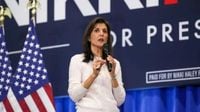On May 8, 2025, Nikki Haley, the former U.S. Ambassador to the United Nations and a prominent Republican figure, expressed unequivocal support for India's right to retaliate against terrorism following a brutal attack in Pahalgam, Jammu and Kashmir. This attack, carried out by Pakistan-backed terrorists on April 22, resulted in the tragic deaths of 26 civilians, including tourists. Haley made her comments in a post on social media platform X, stating, "Terrorists launched an attack that killed dozens of Indian citizens. India had every right to retaliate and defend itself. Pakistan does not get to play the victim. No country gets a pass for supporting terrorist activity."
Haley's remarks came in the context of India's military operation, dubbed Operation Sindoor, which was launched in response to the Pahalgam attack. This operation involved precision strikes targeting nine terror camps located in Pakistan and Pakistan-occupied Kashmir (PoK), utilizing drones and missiles. The operation was characterized by Indian officials as a "measured, non-escalatory, proportionate, and responsible" action aimed at dismantling terrorist infrastructure and deterring further attacks.
Foreign Secretary Vikram Misri addressed the media in New Delhi, reinforcing the rationale behind the military response. He noted that despite clear evidence of terrorist activities emanating from Pakistani soil, the Islamabad government had taken "no demonstrable steps" to address the threats posed by these groups. Misri emphasized that the Indian military's actions were focused on legitimate targets linked to terrorist organizations such as Jaish-e-Mohammed and Lashkar-e-Taiba, and that no civilian or military installations were targeted during the strikes.
In her statement, Haley highlighted the broader implications of Pakistan's actions, arguing that the country can no longer portray itself as a victim in the face of its history of supporting terrorism. "Pakistan does not get to play the victim," she reiterated, pointing out that the nation has long been known as a hub for global terrorism. This sentiment was echoed in Misri's comments, who noted that Pakistan had attempted to mislead the international community by claiming that civilians were targeted during Operation Sindoor.
Despite Pakistan's efforts to counter the narrative by publicizing claims of civilian casualties, Haley and Indian officials argued that the evidence, including images of funerals for militants, undermined such assertions. Misri questioned the veracity of Pakistan's claims, suggesting that the presence of Pakistani military officers at these funerals sent a clear message about the nature of those killed in the strikes.
Haley's stance on the issue reflects her long-standing position on U.S. foreign policy toward Pakistan. During her previous tenure as U.N. ambassador, she consistently advocated for cutting U.S. aid to Pakistan, labeling it a country that harbors terrorists. In her 2024 presidential campaign, which she suspended in March 2024, Haley vowed to stop sending "hundreds of millions" of dollars to countries like Pakistan, arguing that such financial support was indicative of a weak foreign policy.
In an op-ed published in the New York Post, Haley defended former President Donald Trump's decision to slash $2 billion in military aid to Pakistan, emphasizing that the country had provided shelter to terrorists responsible for killing American troops. Her comments resonate with a growing sentiment among some U.S. lawmakers who believe that Pakistan's actions warrant a reevaluation of the financial aid provided by the United States.
As tensions between India and Pakistan continue to escalate, Haley's support for India's military actions has garnered attention, especially in light of the broader geopolitical implications. The Indian government has maintained that its operations are not only necessary for national security but also reflect a commitment to combating terrorism in the region.
In addition to Haley's remarks, former President Trump also weighed in on the situation, expressing hope that the conflict would be resolved quickly. During a press conference, Trump remarked, "We just heard about it as we were walking in the doors of the Oval. Just heard about it. I guess people knew something was going to happen based on a little bit of the past. They've been fighting for a long time. I hope it ends very quickly."
As the situation develops, the international community is watching closely to see how both India and Pakistan navigate this latest chapter in their long-standing conflict. With Haley's statements resonating in political circles, it remains to be seen how this will influence U.S. foreign policy in the region moving forward.
In conclusion, Nikki Haley's strong backing of India's right to retaliate after the Pahalgam attack highlights the complex interplay of international relations, national security, and the ongoing battle against terrorism. Her comments not only reflect her personal convictions but also resonate with a broader narrative regarding Pakistan's role in global terrorism.



